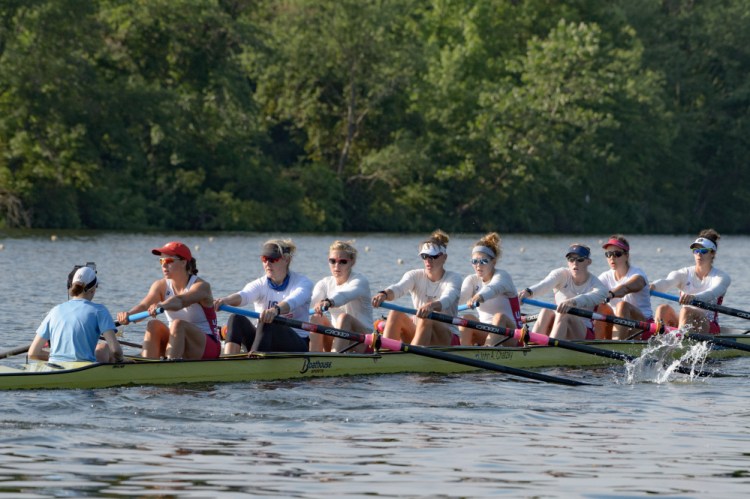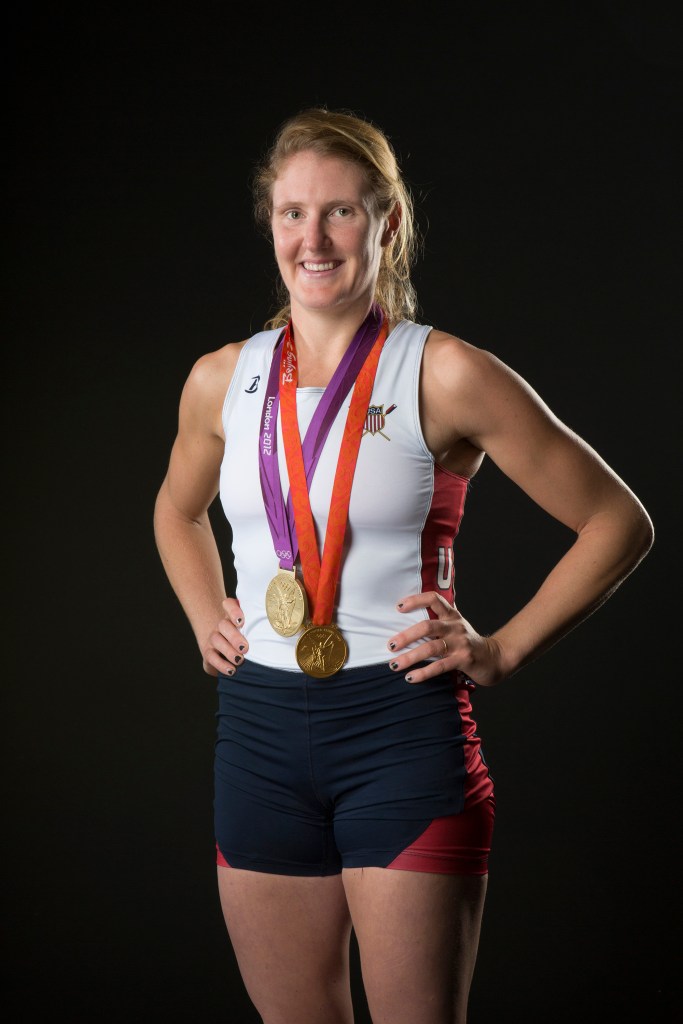Eleanor Logan is on the verge of history. The 28-year-old from Boothbay Harbor is attempting to become the first American woman to win three Olympic gold medals in rowing.
If the U.S. eight-woman rowing team wins next month in Rio de Janeiro – and it is certainly favored to – she will join swimmer Ian Crocker as the only Maine natives to win three Olympic gold medals. Crocker, who grew up in Portland, was a member of winning relay teams at the 2000, 2004 and 2008 Olympics; Logan won gold medals with the women’s eight at Beijing in 2008 and London in 2012. They are the only Mainers to compete in three consecutive Olympics.
But Ellie Logan, as she prefers to be known, has not spent the last four years training for records.
“I really can’t put into words the feeling you get when you’re rowing and racing, only that it’s an addictive feeling,” she said.
The Rio Games will open Friday amid significant health concerns, from the risk of contracting the Zika virus to contamination in the venues where rowing and other water events will be held. As a precaution, U.S. rowers will wear specially designed suits with an anti-microbial finish.
“Definitely I have some concerns, you read about it so much,” Logan said in a phone interview from Princeton, New Jersey, where she was training with the U.S. team. “But whenever you travel to any regatta or any other country, you have to take precautions. You have to follow the guidelines you’re given and be smart.
“It’s really not at the top of my mind. There are probably issues there. Every country has issues but it doesn’t affect the athletes. I know when I saw the announcement that Rio had gotten the Games, I started dreaming about racing there. It was 2010, I think, and I was getting ready for London. But I kept thinking, ‘Wouldn’t it be exciting to be there?’ ”
And that’s why she was willing to endure another four-year Olympic training cycle.
“This is her drive,” said her mother, Jennifer Kierstead. “It’s her competitive instinct. She is just special, driven and very, very, very focused.”
Logan had spent much of the last three years training and racing in smaller boats, the single sculls, pairs and quadruple sculls. While she had levels of success in each boat – especially the pairs – she is back in a boat that hasn’t lost a major international competition in 10 years.
Tom Terhaar, the head coach of U.S. women’s rowing, is glad to have her. In addition to her strength and stamina, Logan brings previous Olympic experience that cannot be understated. She is the only member of the eights back from Beijing and one of two, along with Meghan Musnicki, back from London.
“Having someone who’s been in a couple of Games is very helpful, especially with her ability,” he said. “She’s better than she’s ever been. And she’s tougher than she’s ever been.”
A PASSION FOR THE PERFECT SPORT
Rowing is not an easy sport. It may look easy, even effortless, when it’s done correctly, each oar slicing through the water in unison, the boat seemingly gliding over the water.
In fact, it is a mentally and physically draining sport.
But for Ellie Logan, it is the perfect sport.
“I love to race,” she said. “I love being at the starting line when the gun goes off.”
Logan, who was born in Portland, sometimes wonders what life would have been like if she hadn’t attended the Brooks School in North Andover, Massachusetts. It was there, in her freshman year, that she was introduced to rowing.
At 6-foot-2, 175 pounds, there’s little doubt Logan would have been successful at any sport she attempted. She has natural ability, drive and smarts. Growing up she played soccer, basketball and softball. When she was 8, she asked her mother if she thought she could make the Olympics as a swimmer.
But rowing, Logan said, hooked her from the start.
“It grabbed my interest and my passion just took over,” she said. “There’s something about the teammate aspect that connected with me. And you have to commit 100 percent to it, and not just for yourself, but for the boat and one another.… It became my passion.”
She helped Brooks win national championships in 2004 and 2005. Then she went to Stanford, where she became an All-America rower while juggling going to school and winning her first gold medal in 2008.
Terhaar, while seeing the potential in Logan, didn’t expect her to become the dynamic rower she has become.
“She was going into her junior year (at Stanford) when she made her first Olympic team,” he said. “Physiologically, she was close to the top right away. I knew she’d be at the top, but the level she’s reached? No. She’s been great.”
After London, Logan knew she wanted to continue rowing, but wasn’t sure she wanted to stay in the eights. The training can be consuming, as evidenced by Logan’s answer when asked what she considered home: “My car is my home.”
‘I FEEL LIKE IT’S THE FIRST TIME’
Logan graduated from Stanford in 2011 with a degree in European history. Since then, she has trained full-time with U.S. Rowing, which provides only “minimal funding and health care” for its athletes, according to a spokesperson. Logan has lived with a host family each time she has trained with the team in New Jersey.
“You hear about it every four years, the sacrifice that’s involved,” said Kierstead, her mother. “It’s eat, work out, sleep, work out, eat, sleep. There isn’t much time for anything else, particularly in the two years leading up to the Olympics.”
Going to the smaller boats challenged Logan, gave her more experiences and refocused her. “A small boat exposes you as a rower and you get to know how to move a boat better,” she said. “If you can learn to row each boat, because each one runs differently, you become more valuable in any boat.”
And she became a much better rower.
“Going in the pairs absolutely helped her,” said Terhaar. “The level of competition is raised every day, just to get into a boat. You’re more responsible for the blade in a smaller boat. We use the pairs for training for everyone all year. But she is one of the best.”
Logan said this training cycle has also challenged her like never before.
“I definitely had some moments the last few years when I realized I’ve got to push myself further,” she said. “Every day you have to be at your best, you have to give 100 percent.
“I’m just happy to get another shot at the eights. It’s really hard. In 2008, we had maybe half the people (competing for a spot) that we have now. You have this group, they’re all very good rowers and athletes, training to make this boat. It’s really competitive.”
And that made making the boat even more exciting for her.
“I feel like it’s the first time I’m going to the Olympics,” she said. “I feel like a new rower. I’m bringing everything I’ve learned in the previous cycles and tried to be even better. I’m having a lot of fun. I’m just realizing that now.”
Logan has sat in seat six in years past but said she doesn’t know where she’ll sit in Rio yet because of the versatility of the other rowers. Terhaar said she’ll “be in the stern somewhere.”
“It’s because of her leadership,” he said. “Everyone behind her knows she’s basically setting the rhythm for the starboard side. They know she’s going to pull her butt off all the way down the course and they just try to match and back it up.”
LOGAN’S FINAL OLYMPICS … MAYBE
Logan will be one of two athletes with Maine ties in Rio. Sailor David Hughes, 38, a graduate of Yarmouth High and the University of Southern Maine, will compete at the Olympics for the first time, in the 470 class, a two-person dinghy.
The women’s eight 2,000-meter competition in Rio will begin with trials at 9:30 a.m. Aug. 8. The repechage, a second-chance race for those who don’t advance in the trials, will be held at 8:50 a.m. Aug. 10. The finals will be at 10 a.m. Aug. 13.

Ellie Logan: “I definitely had some moments the last few years when I realized I’ve got to push myself further. Every day you have to be at your best, you have to give 100 percent.” Photo courtesy of USRowing
Logan knows her team will face a lot of scrutiny. The U.S. eights haven’t lost a world championship or Olympic race since 2006, winning 10 races in a row. But the competition is getting faster.
“We have been alerted that there is this expectation,” said Logan. “But we are focusing on what we can control, every day in every practice, and not looking at anything else.”
“We just try to go as fast as we can from A to B and if everything goes right, we have the opportunity to win,” said Terhaar. “We need to make sure we’re in the right place mentally.”
This is likely Logan’s final Olympics, though she added quickly, “I would never say no.” For now, she said she will “take a different path career-wise this fall. I don’t know what it is, but I won’t be training this fall.”
She has tried to maintain a normal life throughout her training. She married Carlos Dinares, a former competitive rower from Spain, last August and recently adopted a six-month-old rescue dog named Bartleby, who shared a photo spread with the women’s eight team in the Sports Illustrated Olympics preview issue.
She will likely go to Seattle with Dinares – who is the sales representative for North America and South America for RP3 Rowing, a company that produces rowing machines – following the Olympics but wants to return home to Maine, too.
“I want to spend some time rowing in the Brunswick area,” she said. “I want to discover the lakes in Maine this fall.”
Send questions/comments to the editors.




